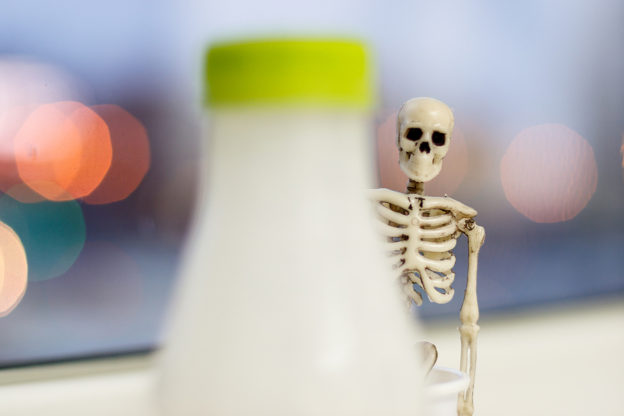By David Blyweiss, M.D., Advanced Natural Wellness
June 29, 2020
Is it really true that milk “does a body good?”
Well, the answer to that depends…
Are you talking about milk for a baby cow, a baby goat, or a baby human? Then yes, milk is great for them.
Are you talking about milk for an adult human? Adults like you and I who are concerned about bone health and longevity?
Then no, milk is not the answer.
Let me explain…
Back in the days before animals were domesticated, adults didn’t drink milk. Only babies and young children did. And it was human breast milk, not cow’s milk.
Fast forward to our modern era and we humans are the only mammals that continue to drink milk after we’ve been weaned. We are also the only ones who consume milk from other species.
Open your arteries, improve blood flow for a new health miracle...
Did you know your circulatory system has over 60,000 miles of arteries, veins and other blood vessels, if stretched end to end?
But as you age, your blood vessels undergo changes, which may cause them to stiffen, thicken and get clogged.
GOOD NEWS! Doctors have now identified a “Miracle Molecule” inside your arteries that helps OPEN your arteries and IMPROVE blood flow.
It’s what Dr. Valentin Fuster calls it, "One of the most important discoveries in the history of cardiovascular medicine."To you, that means...
- Healthy blood pressure
- Sharper mind and memory
- Skyrocketing energy and muscular strength
- Increased pleasure and passion in the bedroom
- Improved circulation to every cell and organ in your body
Go here to discover a new natural way to significantly boost the levels of this miracle molecule in YOUR body NOW!
And it isn’t good for us!
I know this goes against some long held beliefs you may have held. Many of my patients experience the same confusion.
They say, “But Doc, don’t I need milk for my bones?”
I’ll tell you the same thing I tell patients in my office.
First, you don’t need milk for healthy bones. Research has repeatedly shown that dairy products have little or no benefit when it comes to your bone health.
In fact, just three glasses of milk daily is associated with more bone and hip fractures, and nearly twice the risk of premature death in women.
Secondly, the human body was never intended to digest the sugars found in cow’s milk.
These sugars cause a host of problems in your body.
You’ve probably heard of the milk sugar called lactose. Maybe you even know someone who is lactose intolerance. These are the folks who stare at you with envy anytime you indulge in a cheesy pizza or ice cream sundae.
At last count, it was estimated that between 30 and 50 million American adults have lactose intolerance.
But D-galactose, which is produced as lactose breaks down, is an even bigger concern. This milk sugar…
Are You Suffering From...
- Love handles and a pot belly
- Romance that isn't what it used to
- Forgetfulness and inattention
- Low (or no) strength and endurance
- A sex drive that's shifted into neutral...or worse
If so...you may have Mature Male Burnout. Click here to discover more about this unique condition and what you can do about it.
- Prematurely ages the heart muscles
- Increases oxidative stress and reduces antioxidant bioavailability
- Contributes to mitochondrial damage and cardiac dysfunction
- Triggers chronic inflammation
- Increases the risk of certain cancers including prostate, breast and ovarian cancers.
- May contribute to cognitive decline
All in all, patients with higher circulating galactose are at a higher risk of chronic disease in later years. And believe it or not, this includes osteoporosis.
But despite all this scientific evidence, people still think of milk as “wholesome and healthy.”
I’ve seen more than my fair share of patients who experience the discomfort that goes along with lactose intolerance. Even after I explain the cause, they still insist that milk isn’t to blame.
In fact, they’re more likely to blame digestive complaints on everything and anything… as long as it doesn’t include milk or other dairy products.
Why the loyalty to milk?
Well, I’d chalk that up to a very successful marketing campaign from the dairy industry. When people hear over and over again how milk “does a body good,” they tend to believe it.
Better Sources of Calcium for Your Bones
One of the main reasons people hold on to the idea that they need milk is because of its calcium. It’s a common belief that dairy is the best food source of calcium for you bones.
But the truth is, there are many healthier foods that can supply all of the calcium your body needs.
Some healthy, calcium-rich foods include:
- Leafy greens like turnip greens (200 mg/cup), broccoli (180 mg/cup), arugula (125 mg/cup), kale (90 mg/cup), or bok choy (74 mg/cup).
- Fish like canned sardines (325 mg/3 oz) or salmon (180 mg/3 oz).
- Nuts and seeds like sesame seeds (280 mg/1 oz), almonds (80 mg/1 oz,) or sunflower seeds (50 mg/1 oz)
- Beans such as soybeans (260 mg/cup), white beans (200 mg/cup) or black-eyed peas (183 mg/cup)
Dried figs and dates, sweet potatoes, squash, amaranth and oranges also contain appreciable amounts of calcium.
If you don’t think you can get enough of these foods in your diet, there is nothing wrong with supplementing with 1,000 mg of calcium citrate daily. Take it in divided doses; 500 mg early in the day and 500 mg in the afternoon.
But remember, calcium alone does not build strong bones. It works together with potassium, magnesium and vitamins D and K.
Avocado, cantaloupe, artichoke, mangoes and pears are all good sources of potassium. Other foods, such as carrots, peas, broccoli, asparagus, sunflower seeds, almonds are high in magnesium.
You can also supplement with 2,500 mg of potassium and 5 mg of magnesium per pound body weight in two divided doses each day.
As for vitamin D, it helps your body absorb calcium that would otherwise be flushed down the toilet. You can boost vitamin D levels by getting out in the early morning sun (with full body exposure in a bathing suit) for 20 minutes or more each day without sunscreen.
For added protection, take 3,000-4,000 IU of vitamin D3 in the cholecalciferol form daily.
If you need something “dairy-like” to replace your milk with, I enjoy almond, cashew, hemp or coconut milk. Rice and soy milk are also good options.
I wouldn’t wait for TV commercials or billboards to show celebrities with almond milk mustaches.
SOURCES:
Michaëlsson K, et al. Milk intake and risk of mortality and fractures in women and men: cohort studies. BMJ. 2014 Oct 28;349:g6015.
Bo‐Htay C, et al. Effects of d‐galactose‐induced ageing on the heart and its potential interventions. J Cell Mol Med. 2018 Mar; 22(3): 1392–1410.
Qin LQ, et al. Milk consumption is a risk factor for prostate cancer in Western countries: evidence from cohort studies. Asia Pac J Clin Nutr. 2007;16(3):467-76.
Larsson SC, et al. Milk and lactose intakes and ovarian cancer risk in the Swedish Mammography Cohort. Am J Clin Nutr. 2004 Nov;80(5):1353-7.
Health Concerns About Dairy. Physicians Committee for Responsible Medicine.
Petruski-Ivleva N, et al. Milk Intake at Midlife and Cognitive Decline over 20 Years. The Atherosclerosis Risk in Communities (ARIC) Study. Nutrients. 2017 Oct; 9(10): 1134.






